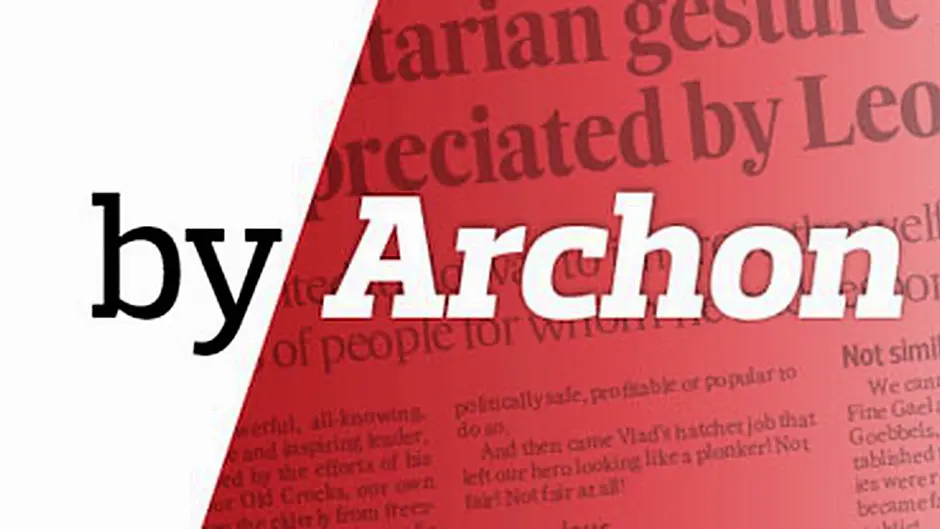Archbishop of Canterbury has warned that the Church of England is only a generation away from total extinction
SOMETHING deeply ironic is at play in the fact that Catholicism is about to overtake Anglicanism as the dominant religion in Britain.
Research shows that more people attend mass every Sunday than those who worship with the Church of England. What’s more, attendance at Anglican Sunday services has dropped by as much as 20%, setting alarm bells ringing.
Because for the first time since Henry VIII broke with Rome and set in motion the English Reformation, the Church of England is facing the possibility of becoming a minority religion!
Three years ago, Archbishop Carey of Canterbury warned that the Church of England was only a generation away from total extinction and that unless something happened to reverse the decline the Catholic Church would again be the largest Christian denomination in England.
Catholics can now be found in the higher echelons of the Tory Party and also among Liberals, Labour, Europhiles and Euro sceptics. What’s more, gone is the perception that Catholics are unreasonable in their attitudes towards the Protestant way of life.
Which is all to the good, one supposes, even though still prevalent is the standpoint adopted by ‘upper class’ English Catholics that Irish Catholicism is way down the social scale. Indeed, snobbery has always characterised traditional English Catholicism as the toffs sought to distinguish their sort of aristocratic Catholicism from the simple faith brought to Britain by working class Irish people.
These same Catholic ‘toffs’ are now the very people who influence ideology within the Conservative Party and have few qualms blending religion with an ultra-right-wing Brexit ideology. The parliamentarian, Jacob Rees-Mogg, is a case in point.
Future Prime Minister
From a bookmaker’s point of view, Rees-Mogg is favourite to be the next Tory prime minister – once the current leader, Theresa May, has been dumped (which may be soon). Interestingly, Rees-Mogg is of the opinion that traditional Catholics, like himself, historically wielded influence within the Catholic Church in Britain because ‘they were all there was.’ Immigrant Irish Catholics, it seems, didn’t meet the required standards.
Yet, the huge influx of Irish Catholics into Britain during the 19th and early 20th century slowly and inevitably changed attitudes, but – because of the cultural nationalism inherent in Irish Catholicism – they also introduced into British life a sense of religious apartness that was to distance Irish Catholicism from the traditional English Catholicism of the Rees-Mogg variety.
The situation is now in the process of readjustment and whereas the Church of England was once the Tory Party at prayer, the impression currently given by Rees-Mogg is that the Tory Party is becoming the Catholic Church at prayer!
Devil’s work
For example, recently he declared that he took the precepts of the Church very seriously and that for him the Church’s teachings on faith and morals were ‘authoritative.’ However he did not want to judge others, although he believed the decisions of EU bureaucrats were the ‘work of the devil’!
According to himself, he would like to see a strong papacy, an obedient laity, Latin masses and ‘sermons that lasted no longer than three minutes.’
But while his quaint political mannerisms and ridiculous top hat might suggest resemblance to Jeeves and Bertie Wooster, his espousal of Catholicism is miles apart from the smarmy religious beliefs expressed by Irish politicos in the old days – such as Fine Gael’s John A Costello, who proudly declared he was a Catholic first and an Irishman second.
Nevertheless, we should not be taken in too much by Rees-Mogg’s theological beliefs. They help conceal an alarming amount of reactionary politics.
He is a rampant Brexiteer, a Trump defender and a crony of Boris Johnson and Nigel Farage. Ominously, he’s no friend of Ireland.
In order to put pressure on the EU and on this country, he urged Theresa May to raise the stakes by means of issuing dire warnings of the knock-on impact of a no-deal Brexit of the Irish economy.
He wants her to hit Ireland’s valuable Irish beef trade with tariffs. ‘If we were to apply the common external tariff on Irish beef, the Irish agricultural industry would be in serious trouble,’ he said, exhorting her to ‘call the EU’s bluff’ and to cripple Ireland unless a border deal was struck.
With all the swagger of a true-blue imperialist, he also proposed that Ireland should leave the single market and customs union and accept British regulations. ‘It’s a logical solution,’ he said with barely concealed disdain of this country’s economic interests.
A Catholic he may be, but it can hardly be said that he is connected to this country by any religious ties or emotional bonds. Far from it. He recently declared that the Six Counties were as much a part of the United Kingdom as Somerset, choosing to describe his party as the ‘Conservative and Unionist Party.’
And, in a recent interview he suggested that the issue of Ireland had undermined British politics for much more than 100 years and that some of the architects of the Good Friday Agreement (such as Sinn Féin) were engaging in ‘disgraceful politics by seeking to keep us in the EU.’
PM’s potato crisps
Interesting too the way in which politics and Catholicism are intersecting in the case of the embattled Prime Minister Theresa May. The former Education Secretary, Michael Gove, believes Catholic social teaching has been central to her politics, and he pronounced her Britain’s first Catholic prime minister, ‘Anglo-Catholic rather than a Roman Catholic, but no less a Catholic for that,’ he explained.
With a perfectly straight face, he revealed that the British prime minister abstained from eating her favourite potato crisps for Lent which, he said, ‘may not appear to be headline news but the principle of Lenten sacrifice, of giving up something cherished to recall the 40 days Jesus spent in the wilderness, is a discipline observed by many Christians. It is particularly a feature of Catholic practice.’
Gove remarked that May’s politics could best be understood by examining them through a Catholic prism, ‘particularly Catholic social thought.’
It seems that, for the British Conservative Party to stay in power, the public espousal of religion (in this case English Catholicism) is there to be exploited as an effective political instrument.
Lesson to learn
For years, Irish politicos held a somewhat similar point of view until sexual controversies among the clergy showed that the political use of religion had lost its effectiveness in getting a successful electoral result.
And in Britain, where upper class Catholics are now promoting a combination of politics and religion in the expectation that it will have the capacity to touch psychological chords among the electorate, the eventual outcome may not be to the benefit of the Tories.
We know that. We’ve been there. But It’s a lesson Jacob Rees-Mogg and his Conservative Catholic toffs yet have to learn.








